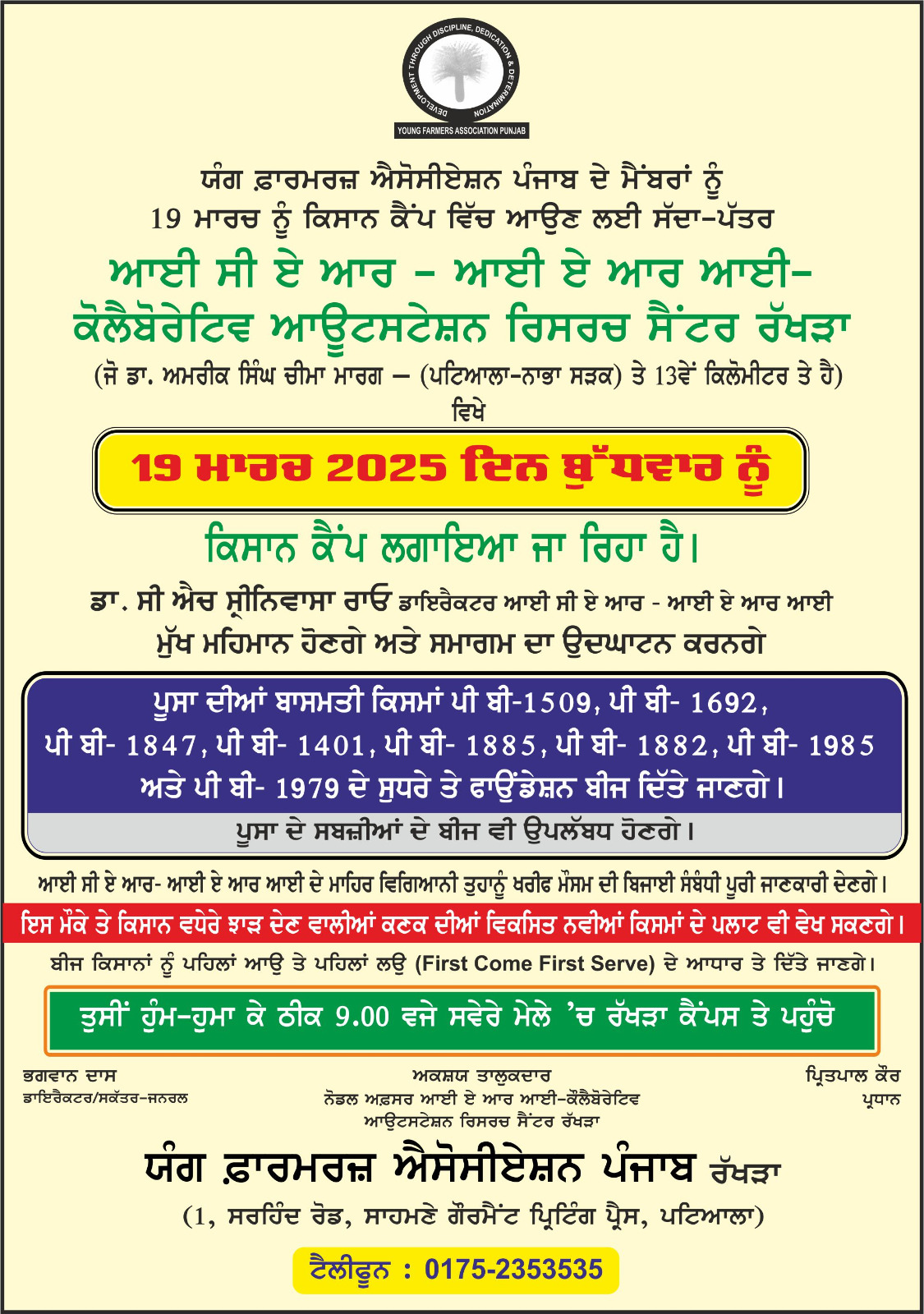YFA- Symbols of farmers strength
Rakhra – now an internationally known village- is a symbol of farmers’ strength. Benefits of technical know-how and inputs of new seeds are flowing to farmers of the state from here.
It was 50 years ago that this village came into prominence with the launching of the young farmers’ movement. At this time Rakhra was one of the most agriculturally backward areas. The inhabitants struggled hard to eke out a living from their land which was saline and ‘kallar’. Then something happened. In 1956, a process was started which completely changed the lives of those who lived in and around Rakhra.
Late Dr. Amrik Singh Cheema, a former Vice-Chancellor of Punjab Agricultural University, visited the area. He was disappointed to find the sad state of farming. Farm families lived in a miserable condition. He talked to a few farmers and came to the conclusion that providing extension services in the form of lectures and pieces of advice by state government agencies will not deliver the goods. A multifaceted approach was necessary to solve the problems of farmers. This included the involvement of farmers and various government agencies in developing the village infrastructure and helping social and cultural integration.He approached a few enthusiastic young farmers and organized them. And thus came into being the “Young Farmers Association (YFA)”.
Dr. Cheema told young men: “There is more in you than there is in your land.” Rakhra became a legend for it was here that a novel experiment in agricultural development through youth power was started which became a model. The willingness to learn on the part of the young farmers gave birth to a new concept of agricultural reconstruction which later transformed the countryside.
To achieve the objective of increasing production and farm income, a number of educational courses for farmers were organized at Rakhra Campus. The FAO came forward to strengthen the programme. Young men came from other countries under the youth exchange programme. Demonstrations in ‘kallar’ reclamation, for use of new machines and better farming techniques, were arranged. In villages, farmers’ clubs were organized on the pattern of 4-H Clubs.
The association took a lead in introducing the village adoption approach. Towards the close of the sixties, it adopted nine villages for all-round development and organized training courses for officers entrusted with the work of agricultural finance in commercial banks. The officers stayed in the villages for a week which changed their outlook and built up their confidence to work with a “new type of clientele.” These officers later worked in senior positions in the agricultural finance departments of various banks.
Rice is now principal Kharif crop of the state. YFA-trained farmers serve as catalytic agents to others for adoption of new technology and seeds. Pusa Basmati-I, Pusa 44 and Pusa 1121 varieties introduced in the state by YFA occupy a large area and have resulted in much better economic returns to the growers.
HD 2329, the highest yielding wheat variety which at one time occupied more than 85 percent area under cultivation of wheat in the state was also brought by the association at the beginning of the eighties. Its breeder late Dr. V.S. Mathur conducted experiments at the association’s farm for years. PR 106 variety of rice also reached the growers from the Rakhra campus in 1976.
The association has at present more than 10,000 members to benefit from it. They are invited twice a year at the Kisan Melas organized by the association. These festivals are different from PAU festivals Melas organized by PAU are only for technologies developed by PAU. YFA equips the farmers with new research done beyond the state particularly at IARI.
The members of the association who benefited included gypsies (bazigars). Banjar shamlat lands got leased out/allotted to them now grow lush green crops and provide a handsome living to them in certain villages. About 50 families of “Kumhars” (potters) are earning their living as a result of help rendered by YFA.
The association has suggested varietal diversification in rice by adopting and enlarging area under basmati cultivation as a short-term solution to the exhaustive rice-wheat rotation. The Association has tied up with the Indian Agricultural Research Institute. The association’s farm demonstrates the new varieties developed by Pusa and provides them foundation seeds of the successful varieties. IARI’s scientists regularly visit the Rakhra Campus for monitoring the programmes. A project to benefit the surrounding villages and member farmers and achieving diversification has been launched in collaboration with IARI. Soon the association will jump into biotechnology to benefit the farmers. A few schemes concerning this are underway.
Written by:
Sh. Bhagwan Das
Secretary General
Young Farmers Association, Punjab (YFA)




